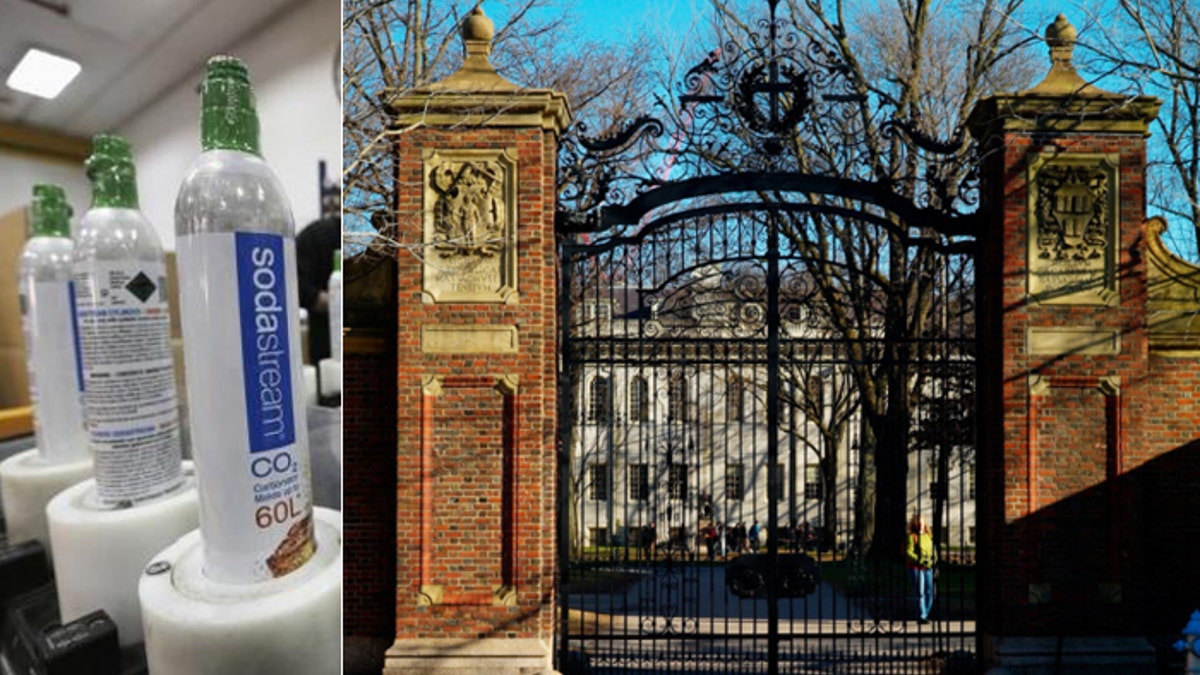
A ban of SodaStream products, lobbied for by pro-Palestinian students, was reversed by Harvard's top brass. (Reuters, AP)
The brain trust at Harvard has bottled up a political dispute, reversing the dining hall's decision to cut ties with an Israeli soda company based on one-sided input from pro-Palestinian student groups.
The decision last week by university President Drew Faust and Provost Alan Garber came quickly after they discovered that Harvard University Dining Services had decided to stop buying SodaStream products due to the company's presence in the West Bank. The company, which makes flavoring and carbonating machines, has defended its factories in the territory, saying it has created jobs for hundreds of Palestinians. In a statement, Garber said the Ivy League school's contracting policies are not to be dictated by partisan student groups.
“Harvard University’s procurement decisions should not and will not be driven by individuals’ views of highly contested matters of political controversy,” Garber said in a statement sent to Boston Magazine. “If this policy is not currently known or understood in some parts of the University, that will be rectified now.”
[pullquote]
The dining hall administrators agreed last fall to cut ties with SodaStream after meeting with the school's Palestine Solidarity Committee, and the Harvard Islamic Society, according to the student newspaper The Crimson.
“These machines can be seen as a microaggression to Palestinian students and their families and like the University doesn’t care about Palestinian human rights,” Rachel Sandalow-Ash, a Harvard student and member of the school's Progressive Jewish Alliance, told the paper.
But the decision did not go over well with everyone on campus. Harvard Law Professor Alan Dershowitz penned an op-ed for the The Jerusalem Post in which he said a boycott would have been a more just and effective way to make a statement.
“I’m sure that some students are offended by any products made in Israel, just as some are offended by products made in Arab or Muslim countries that oppress gays, Christians, and women,” he wrote. “The end result should be freedom of choice: those who disapprove of SodaStream should be free to drink Pepsi. But those who don’t disapprove should be free to drink SodaStream.”
Faust and Garber took action quickly after learning of the dining hall's decision.
[image]
“As President Faust has indicated to members of the Harvard community who have made inquiries, she and I both learned of this issue from today’s Crimson,” Garber said in a statement. “She has asked staff to get to the bottom of how these conversations started, and to learn more about where matters currently stand.”
Harvard University Dining Services quickly backtracked, and apologized.
“We value and regularly seek input on a wide range of issues from members of the community who use HUDS facilities," Crista Martin, a spokesperson from HUDS, said in a statement. "In this instance, we mistakenly factored political concerns raised by students on a particularly sensitive issue into a decision on soda machines,” the statement, sent to Boston, read. “As the President and Provost have made clear, our procurement decisions should not be driven by community members’ views on matters of political controversy.”
SodaStream announced in October that it plans to close the West Bank factory and move operations to a location inside Israel, but officials insisted the move was for business reasons and not in reaction to an international boycott. The company has said it will try to retain its employees, although they would face commutes of up to 60 miles.
[image]
"We are offering all employees the opportunity to join us in Lehavim and, specifically, we are working with the Israeli government to secure work permits for our Palestinian employees," SodaStream Chief Executive Daniel Birnbaum said.
The controversy over SodaStream's West Bank presence bubbled over earlier this year, when actress Scarlett Johansson was pressured into choosing between her endorsement of the company and her position with Oxfam International, a humanitarian aid organization for which Johansson had served as a global ambassador for eight years. She quit the charity and defended SodaStream's record of employing Palestinians.

